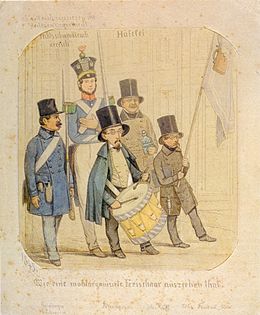
Freikorps were irregular German and other European military volunteer units, or paramilitary, that existed from the 18th to the early 20th centuries. They effectively fought as mercenary or private military company, regardless of their own nationality. In German-speaking countries, the first so-called Freikorps were formed in the 18th century from native volunteers, enemy renegades, and deserters. These, sometimes exotically equipped, units served as infantry and cavalry ; sometimes in just company strength and sometimes in formations of up to several thousand strong. There were also various mixed formations or legions. The Prussian von Kleist Freikorps included infantry, jäger, dragoons and hussars. The French Volontaires de Saxe combined uhlans and dragoons.

A militia is generally an army or some other fighting organization of non-professional and/or part-time soldiers; citizens of a country, or subjects of a state, who may perform military service during a time of need, as opposed to a professional force of regular, full-time military personnel; or, historically, to members of a warrior-nobility class. When acting independently militias are generally unable to hold ground against regular forces; militias commonly support regular troops by skirmishing, holding fortifications, or conducting irregular warfare, instead of undertaking offensive campaigns by themselves. Local civilian laws often limit militias to serve only in their home region, and to serve only for a limited time; this further reduces their use in long military campaigns. Militias may also, however, serve as a pool of available manpower for regular forces to draw from, particularly in emergencies.
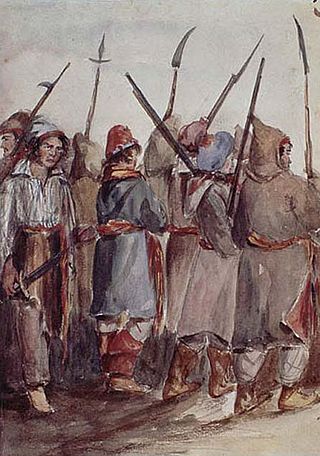
Irregular military is any non-standard military component that is distinct from a country's national armed forces. Being defined by exclusion, there is significant variance in what comes under the term. It can refer to the type of military organization, or to the type of tactics used. An irregular military organization is one which is not part of the regular army organization. Without standard military unit organization, various more general names are often used; such organizations may be called a troop, group, unit, column, band, or force. Irregulars are soldiers or warriors that are members of these organizations, or are members of special military units that employ irregular military tactics. This also applies to irregular infantry and irregular cavalry units.
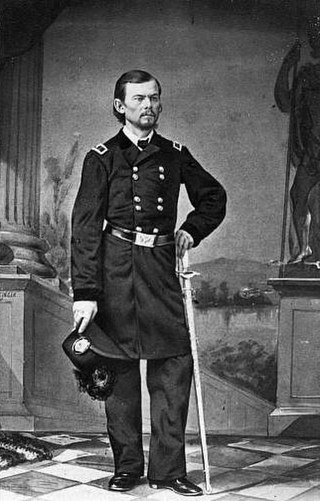
Franz Sigel was a German American military officer, revolutionary and immigrant to the United States who was a teacher, newspaperman, politician, and served as a Union major general in the American Civil War. His ability to recruit German-speaking immigrants to the Union armies received the approval of President Abraham Lincoln, but he was strongly disliked by General-in-Chief Henry Halleck.

Friedrich Franz Karl Hecker was a German lawyer, politician and revolutionary. He was one of the most popular speakers and agitators of the 1848 Revolution. After moving to the United States, he served as a brigade commander in the Union Army during the American Civil War.
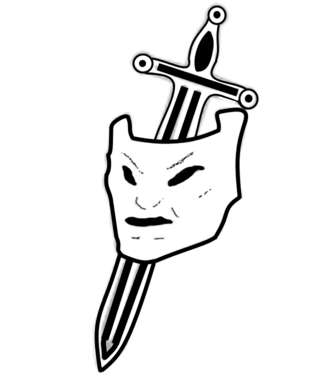
The Brandenburgers were members of Nazi Germany's Wehrmacht special forces unit during World War II.

After 1918, the term Freikorps was used for the anti-communist paramilitary organizations that sprang up around the German Empire and the Baltics, as soldiers returned in defeat from World War I. It was one of the many Weimar paramilitary groups active during that time.

The Foreign Legion has had a long and unique history amongst the units of the French Army. It was historically formed of expatriate enlisted personnel led by French officers. Founded by a royal ordinance issued by King Louis Philippe of France on March 9, 1831 with aim of bolstering the strength of the French Army while also finding a use for the influx of refugees inundating France at the time. The Foreign Legion subsequently found a permanent home in the ranks of the French military. The Foreign Legion's history spans across Conquest of Algeria, the Franco-Prussian War, numerous colonial exploits, both World Wars, the First Indochina War, and the Algerian War.

The Italian National Republican Guard was a gendarmerie force of the Italian Social Republic created by decree on December 8, 1943, replacing the Carabinieri and the National Security Volunteer Militia (MVSN). General Renato Ricci appointed as its commandant. Major General Italo Romegialli was appointed vice commandant and Major General Niccolò Nicchiarelli became the chief of general staff.
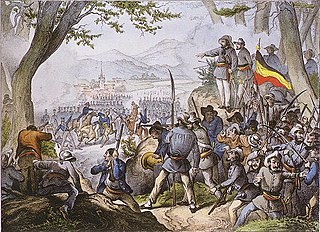
The Hecker uprising was an attempt in April 1848 by Baden revolutionary leaders Friedrich Hecker, Gustav von Struve, and several other radical democrats to overthrow the monarchy and establish a republic in the Grand Duchy of Baden. The uprising was the first major clash in the Baden Revolution and among the first in the March Revolution in Germany, part of the broader Revolutions of 1848 across Europe. The main action of the uprising consisted of an armed civilian militia under the leadership of Friedrich Hecker moving from Konstanz on the Swiss border in the direction of Karlsruhe, the ducal capital, with the intention of joining with another armed group under the leadership of revolutionary poet Georg Herwegh there to topple the government. The two groups were halted independently by the troops of the German Confederation before they could combine forces.
The Baden Revolution of 1848/1849 was a regional uprising in the Grand Duchy of Baden which was part of the revolutionary unrest that gripped almost all of Central Europe at that time.
The Ustaše Militia was the military branch of the Ustaše, established by the fascist regime of Ante Pavelić in the Independent State of Croatia (NDH), an Axis puppet state established from a large part of occupied Yugoslavia during World War II.
The Hadžiefendić Legion or Muslim Legion was a Bosniak self-defence militia and Croatian Home Guard unit based in the predominantly Muslim Tuzla region of the Independent State of Croatia (NDH) during World War II. The brigade–sized force was formally a "Volunteer Home Guard Regiment", and was raised in late December 1941 under the command of the former Royal Yugoslav Army reservist Major Muhamed Hadžiefendić, who had been commissioned into the Croatian Home Guard. By the end of the year, the Legion had commenced forming battalions in six towns in northeastern Bosnia.

The Palatine uprising was a rebellion that took place in May and June 1849 in the Rhenish Palatinate, then an exclave territory of the Kingdom of Bavaria. Related to uprisings across the Rhine river in Baden, it was part of the widespread Imperial Constitution Campaign (Reichsverfassungskampagne). Revolutionaries worked to defend the Constitution as well as to secede from the Kingdom of Bavaria.

The Battle of Kirchheimbolanden was the first battle in the Palatine Uprising of 1849. It took place on 14 June near Kirchheimbolanden and ended in the defeat of the volunteers (Freischaren) by the Prussian Army.

The Storming of Freiburg took place on 24 April 1848 during the Baden Revolution. Units of the VIII Army Corps of the German Confederation stormed the town of Freiburg im Breisgau, which was occupied by republican volunteers (Freischärlern).
The Battle of Günterstal took place on 23 April 1848 during the Baden Revolution at Jägerbrunnen not far from the village of Günterstal. Here government troops stopped a vanguard of the militants who were advancing towards the city of Freiburg im Breisgau under Franz Sigel.
The Baden Army was the military organisation of the German state of Baden until 1871. The origins of the army were a combination of units that the Badenese margraviates of Baden-Durlach and Baden-Baden had set up in the Baroque era, and the standing army of the Swabian Circle, to which both territories had to contribute troops. The reunification of the two small states to form the Margraviate of Baden in 1771 and its subsequent enlargement and elevation by Napoleon to become the Grand Duchy of Baden in 1806 created both the opportunity and obligation to maintain a larger army, which Napoleon used in his campaigns against Austria, Prussia and Spain and, above all, Russia. After the end of Napoleon's rule, the Grand Duchy of Baden contributed a division to the German Federal Army. In 1848, Badenese troops helped to suppress the Hecker uprising, but a year later a large number sided with the Baden revolutionaries. After the violent suppression of the revolution by Prussian and Württemberg troops, the army was re-established and fought in the Austro-Prussian War of 1866 on the side of Austria and the southern German states, as well as in the Franco-Prussian War of 1870 on the side of the Germans. When Baden joined the German Reich in 1870/71, the Grand Duchy gave up its military sovereignty and the Badenese troops became part of the XIV Army Corps of the Imperial German Army.
The German Democratic Legion was a volunteer unit formed by exiled German craftsmen and other emigrants in Paris under the leadership of the socialist poet Georg Herwegh, which set out for the Grand Duchy of Baden at the beginning of the German Revolution of 1848 to support the radical democratic Hecker uprising against the Baden government. A week after the military defeat of the uprising, the German Democratic Legion was also defeated and wiped out by Württemberg troops on April 27, 1848 in the battle of Dossenbach.
